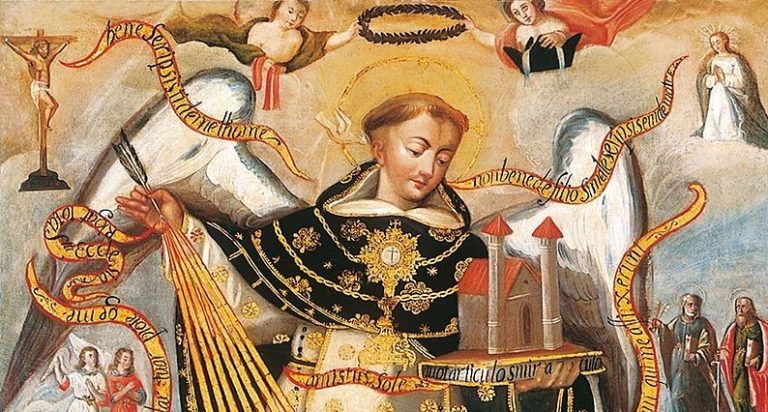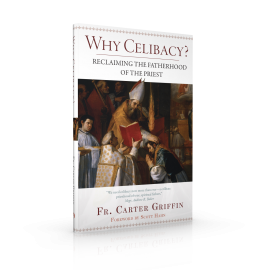By Fr. Carter Griffin
Fr. Carter Griffin is a priest of the Archdiocese of Washington. Since 2011 he has been engaged in the formation of seminarians at Saint John Paul II Seminary in Washington, DC. Fr. Griffin is a graduate of Princeton University and a former line officer in the United States Navy. He is the author of Why Celibacy?: Reclaiming the Fatherhood of the Priest.

Some have understandably asked why priestly celibacy cannot be optional, especially given the shortage of vocations and the profoundly disturbing violations of celibacy in recent years. Celibacy is clearly not a prerequisite for priesthood since there are validly ordained priests who are married in the Eastern Churches and by exception in the Latin Rite. It seems like a prudent, even self-evident, choice to make celibacy optional. There is today, as a consequence, tremendous pressure being exerted on the Church to diminish her adherence to celibacy.
Moving toward optional celibacy, however, despite its apparent benefits, would be a great mistake—and for many reasons.
As a path to avoiding sexual abuse, making celibacy optional would miss the mark. Celibacy itself is not the cause of abuse. If it were, then the answer would not be optional celibacy but mandatory marriage! As observed earlier, sexual abuse is no more caused by being celibate than adultery is caused by being married. Allowing priests to marry would not prevent sexual transgressions. Marriage, after all, is regrettably no stranger to scandal. Indeed, the notion that “marrying off” priests will resolve the sex abuse crisis suggests a rather dim view of marriage as well as a certain naiveté about the rate of sexual abuse committed by individuals who are married.
The holy vocation to matrimony is not a cure for sexual drives that are imagined, erroneously, by the popular mind to be irrepressible. The problem is not with celibacy lived; it is with celibacy badly lived. The problem is not that wayward priests were unmarried; the problem is that they were unfaithful. Medieval doctors, with the best of intentions, often treated diseases by draining the blood of their patients, unwittingly depriving them of the very nutrients that they needed to get well. Even so, those looking to cure the disease of sexual abuse in the Church by draining her of the grace of celibacy would do little to cure the disease, and yet would deprive the Body of Christ of spiritual nutrients needed to return to health. If we wish to address the problem of clergy sexual abuse, we should begin by expecting the same fidelity from our priests that we expect from everyone else and call them to embrace, through the gift of celibacy, the blessings of priestly fatherhood that we need today more than ever. Otherwise we risk losing all the graces and benefits of celibacy without actually solving the problem of clergy sexual abuse.
Neither is optional celibacy an expedient to relieve a shortage of priests. While there might be a brief surge of new seminarians, the experience of non-Catholic communities that have relaxed their own ordination requirements by no means promises that the surge—if it comes at all—will last. In fact, the push for optional celibacy fails to grasp the cultural landscape in which we live. If marriage is an option, then the blunt reality is that priests who opt for celibacy will be presumed, in the minds of many, to have ambiguous sexual attractions. Moreover, since episcopal ordination would presumably still be limited to celibate priests, as in the Eastern Church, the choice to forgo marriage (and hence remain eligible for the episcopate) would also likely invite cynical conjectures. Optional celibacy would lead to a two-tiered priesthood in which either mediocrity or clerical ambition thrive all too easily.
Even if these pitfalls could somehow be avoided, optional celibacy would throw needless confusion in the path of those discerning the priesthood. Celibacy is a beautiful gift to the Church and to the priest himself, but without a doubt it is sometimes a gift difficult to understand, difficult to receive, and difficult to live—especially for the young. It enkindles a noble generosity in the heart of a young man, but like all deep human loves, the capacity for celibacy takes time to mature. It is true that some seminarians would still choose celibacy, even were it optional. However, who could doubt that many—who otherwise could receive the beautiful grace of celibacy—would simply assume it is not for them? How many graces of celibacy would be forfeited by making it unnecessarily difficult for those in priestly discernment to receive this gift?
There is yet another, even greater difficulty with calls for optional celibacy. The priesthood is not a position over which the Catholic Church has complete control, since it is fundamentally not her priesthood but that of Jesus. Certainly, since there are valid and married priests, it is clear that celibacy is not necessary to exercise the ministerial priesthood. Nonetheless, it is also true that the priesthood itself, which is the priesthood of Christ—that in which all ministerial priests share—is essentially a celibate priesthood. Jesus exercised his ministry on earth as a celibate priest and continues to do so from heaven. Even the Eastern Church, as already noted, limits the episcopate to celibate priests, a sign that celibacy is integral to the priesthood.
This “essential but not necessary” quality of celibacy may be explained by a deep harmony between celibacy and the priesthood. Galot calls this “an essential bond since celibacy conforms to the very nature of the priesthood,” though he emphasizes that it “is absolutely necessary neither for the validity of the priesthood nor for the valid and fruitful accomplishment of priestly functions.” Celibacy is no more “necessary” to the priesthood, French theologian Bertrand de Margerie writes, than “the Incarnation demanded, in an absolute way, celibacy in the sacred humanity of Jesus.” Though not necessary, then, it is eminently suitable, even normative, to the priesthood.
Moreover, if supernatural fatherhood is indeed constitutive of the priesthood, and celibacy is ordered to reflecting and exercising that fatherhood, it follows that celibacy is more than an arbitrary “discipline” imposed by ecclesiastical authority. It is only partly subject to the Church’s prudential judgment. That is why priestly celibacy (or perpetual continence) has been a part of her life since apostolic times. There has been historical development, of course, but despite repeated calls through the centuries to abandon celibacy, the Church has steadfastly refused to do so. In fact, she has repeatedly reaffirmed the blessing of priestly celibacy and recommitted herself to fostering it more faithfully in her clergy.
Proposals to diminish our commitment to celibacy derive, I believe, largely from a spirit of fear and a failure to see the radical claims of the priesthood, rather than from an evangelical spirit of confidence in God’s grace. As in every age, God will remain faithful and will enable his priests to live their celibacy well.
You Might Also Like

Priestly celibacy, some say, is an outdated relic from another age. Others see it as a lonely way of life.
But as Fr. Carter Griffin argues in Why Celibacy?: Reclaiming the Fatherhood of the Priest, the ancient practice of celibacy, when lived well, helps a priest exercise his spiritual fatherhood joyfully and fruitfully.